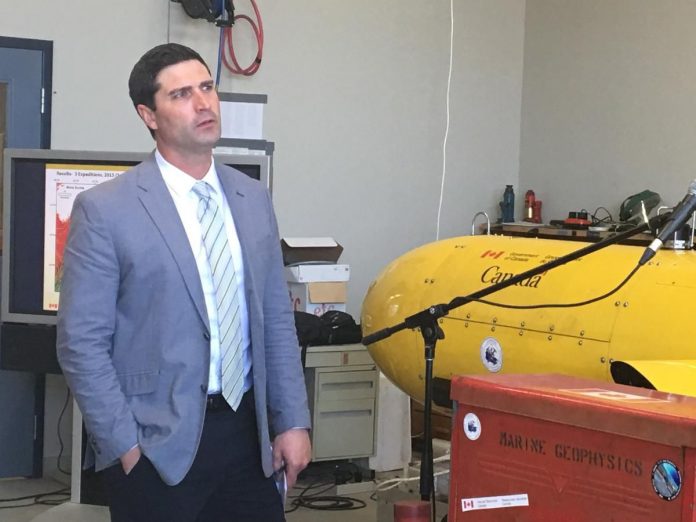[ad_1]
HALIFAX—Nova Scotia has committed millions of dollars to encourage offshore exploration, hoping to bring billions more in oil riches — even as ecologists say the cash would be better used to counter carbon emissions.
Energy Minister Geoff MacLellan announced $11.8 million Wednesday for research in waters off the province.
“There is value for us, there is tremendous work being done in the offshore, and … we’re going to be world leaders in the oceans,” MacLellan said during a news conference at the Bedford Institute of Oceanography.
The exploration program collects core samples and makes maps of the ocean bottom and sub-bottom. The program is also working to recreate seismic images from 200 million years ago when Nova Scotia and Morocco separated.
However, a spokesperson for Halifax’s Ecology Action Centre, said the funding is no longer appropriate in an era when Canada has signed on to the Paris Agreement to attempt to reduce carbon emissions.
“It’s 2018, and were spending millions of dollars of public money supporting the oil and gas industry to explore for billions of barrels of oil … We don’t think that’s the way forward,” said Stephen Thomas, the centre’s energy campaign co-ordinator.
If provincial projections of eight billion barrels of oil in the province’s offshore were to prove correct, he said, it wouldn’t be wise to release their carbon emissions into the atmosphere.
Nova Scotia in particular is already feeling the effects of escalating climate change, with increasing frequency of storms, coastal erosion and tidal surges, he said.
“There really isn’t a world where we burn all that oil and meet our climate commitments.”
Thomas suggests that the money would best be spent on developing companies and programs in Nova Scotia that encourage energy efficiency.
“We’d love to see continued investment in energy efficiency and renewable energy,” he said.
Thomas cites a study by the advocacy group Efficiency Canada that suggests 4,200 jobs per year could be created in Nova Scotia over the next 12 years if the province were to reduce energy consumption by about two per cent annually.
However, Carey Ryan, director of business development at the Offshore Energy Research Association, said Wednesday that he’s optimistic this round of oil and gas research will unlock further industry interest in Nova Scotia — which has brought billions of dollars of investment in the past.
“The research that’s being undertaken is absolutely critical to attracting exploration activity to this province,” he said.
Ryan said in the early 1990s, when oil exploration had almost died in Nova Scotia, his group collaborated with government to come up with research proposals aimed at renewing interest in offshore oil exploration.
The research helped lead to the Sable Offshore Energy Project, he said.
Further provincially funded work, called the Play Fairway Analysis, led to offshore oil exploration by Shell and BP in the region southwest of Sable Island since 2013.
“It was the foresight that … has caused companies to begin seriously looking at offshore Nova Scotia again,” Ryan said.
Ryan said although exploration has been going on for 60 years off the province, an area larger than the Gulf of Mexico remains “relatively unexplored,” in comparison to other oil-producing regions.
“The money we’re spending on geoscience is reducing the information gaps … and that is drawing investment into the province.”
Some of the latest research introduced at the news conference involved using microbiology to further pinpoint where oil and gas may be on the Scotian Shelf.
Todd Ventura, a professor of geology at Saint Mary’s University, said genomic technology is being employed to examine microbes found in core samples.
Initial high-resolution scans of the ocean bottom create images of where oil and gas may be seeping through to the surface.
Ventura said when core samples are taken from those locations, his team can then search for the density and type of microbes in the samples it retrieves.
By layering the microbes data onto the geological information, it decreases the risks to the oil and gas industry as it tries to decide where to drill, he said.
“We are trying to extract the DNA these organisms have that is unique to them, and only to them, and then we can tell who they are,” he explained.
“We like to think we’re at the forefront of this.”
However, Thomas raised questions about whether universities should be joining the province in this research, while noting it is public funding ultimately driving the work.
“This isn’t the future. We can’t live in a world where we continue to explore for oil and gas and exploit it way out into the future, and have a livable planet,” he said.
[ad_2]








